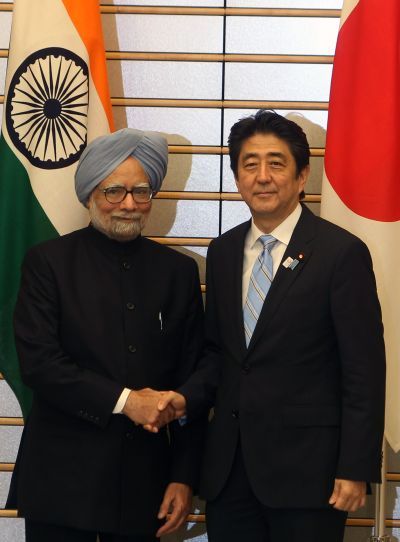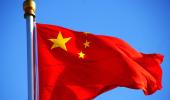 Prime Minister Shinzo Abe will arrive in India on Saturday, the guest of honour at this year's Republic Day.
Prime Minister Shinzo Abe will arrive in India on Saturday, the guest of honour at this year's Republic Day.
As Japan beefs up its defences against China, both New Delhi and Tokyo seem to have decided to re-energise their relationship to ensure a strategic balance in Asia, says Nitin Gokhale.
In 2006 US President George W Bush and Shinzo Abe, then in his first term as Japanese prime minister, each in their own way achieved far-reaching changes in their respective ties with India.
While Bush helped end the nuclear apartheid against India, Abe unambiguously declared (in 2007) that 'a strong India is in the best interest of Japan and a strong Japan is in the best interest of India.'
Since then, after the initial euphoria, India-US ties have plummeted perhaps to their lowest level in the past two decades, not least because of the recent Devyani Khobragade affair.
The relationship between India and Japan, on the other hand, has found new momentum in the past couple of years. It is no surprise to find that Abe is at the helm in Tokyo again.
Abe's visit to New Delhi as chief guest for the Republic Day celebrations will in fact cap a series of high-level visits by Japanese leaders over the past few months. This included the historic visit of Emperor Akihito and Empress Michiko to India in December.
They were returning to the country 53 years after their 1960 trip as the crown prince and princess of Japan. Their symbolic visit apart, the fact is that during the last five years, bilateral trade has increased 80 per cent; currently it is at $18 billion.
Although this is nowhere near the India-China bilateral trade figure, which is now inching towards $100 billion, Japan and India have set a goal of $25 billion this year.
It must also be remembered that in recent decades, Japan has quietly extended financial and technical support to several infrastructure projects in India, helping to build metro railway systems and industrial corridors, dedicated freight corridors, highways, bridges and power plants.
Now the two countries are finding new avenues of cooperation. Last week Japan's Defence Minister Itsonuri Onodera spent four days in India exploring and finalising various ways to take the fledgling defence cooperation between New Delhi and Tokyo to the next level.
Onodera and his Indian counterpart A K Antony said at the end of their meeting in New Delhi that India and Japan will 'further consolidate and strengthen their strategic and global partnership in the defence arena through measures ranging from regular joint combat exercises and military exchanges to cooperation in anti-piracy, maritime security and counter-terrorism.'
As a first follow up India and Japan will hold their third '2 plus 2' dialogue and fourth defence policy dialogue in New Delhi later this year.
Also the third bilateral exercise between the Japan Maritime Self-Defence Force and the Indian Navy will be held in Japanese waters.
Two plus two is a dialogue involving both foreign and defence ministry officials. On January 14, a small exercise involving Coast Guard ships from India and Japan was in fact held in the Arabian Sea.
Joint exercises apart, India and Japan are expanding their defence ties in other ways. The two sides will also conduct 'expert exchanges' in counter-terrorism, humanitarian assistance/disaster relief between the Indian Army and the Japan Ground Self Defence Force.
The possibility of conducting staff talks between the Japan Air Self-Defence Force and the Indian Air Force as well as professional exchanges of test-pilots, flight safety experts and others is also in the offing.
Unstated in the future road map is the aim to achieve convergence in security matters to counter an increasingly belligerent China bent on asserting itself in long-standing issues with not just India and Japan, but with other smaller nations in Asia as well.
New Delhi, inherently leery of becoming part of any alliance or bloc, is hoping to create enough synergy with Tokyo and other Association of South East Asian Nations to deter China.
The rising profile of the Indo-Japanese relationship is certainly an outcome of the collective unease in Asia over what many think is China's rambunctious behaviour.
With tensions exacerbating in the South China Sea and East China Sea, it is natural that all those affected by a rising China would strive to build a 'strategic deterrence' against the rapidly expanding Chinese navy.
Further efforts to stitch together a pan-Asia security architecture to keep China in check may be in the offing given that the US has shown a reluctance to take China on directly, despite its much-discussed pivot or rebalance to Asia.
The recent stand-off over China's decision to unilaterally enforce an Air Defence Identification Zone in the East China Sea, including the disputed Senkaku/Diaoyu islands, appeared to show the limits of US intervention.
In fact, Asian nations may be better off finding their own solutions to the regional disputes. Individually, they may not be able to stand up to China's bullying, but together there is a chance to keep China in check.
India and Japan, along with South Korea, may have to take the lead in this respect.
Nothing rattles China more than other nations 'ganging up' on it. It is worth recalling what happened during Exercise Malabar 2007 -- normally a bilateral naval exercise between India and US, that year, for the first and last time, it also involved the Singaporean, Australian and Japanese navies.
Beijing, sensing an anti-China naval platform in the making, promptly issued a demarche to all five participants. Since then, Exercise Malabar has reverted to being a bilateral venture.
Those days of humouring China may now be over, at least judging by the way Abe has been reshaping Japan's foreign and defence policies in recent months.
A new document, prepared by a group of experts that Abe had appointed, has suggested Japan 'strengthen its own capabilities and expand its own roles' by bolstering its anti-missile defences and its ability to defend the freedom of navigation in its surrounding seas, a reference to the Senkaku/Diaoyu islands dispute with China.
As Japan beefs up its defences against China, both New Delhi and Tokyo seem to have decided to re-energise their relationship to ensure a strategic balance in Asia.
India inviting Abe as chief guest for the Republic Day Parade -- an honour normally reserved for its closest allies -- is a clear signal that Asia's two biggest democracies may be ready to work together in containing if not confronting China in the years to come.
Image: Dr Manmohan Singh with Japanese Prime Minister Shinzo Abe.
This article first appeared in The Diplomat.











 © 2025
© 2025